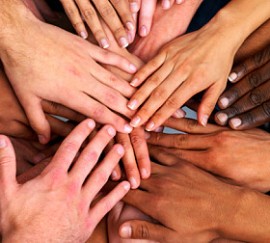 Everywhere there is an outpouring of love, kindness, unity and sharing. We’re finding that in the vital and very important social distancing, we can unite our hearts together and help one another. We can reach out to others over the internet, social media, phones–even offering to leave food/groceries on doorsteps of those who need it. We are using our creativity to sing to others from our balconies, offer free live concerts from our homes, or give free tutorials online in painting or even easily crafting a face mask. Even in the necessary isolation and social distancing (and even because of it), the interconnectedness of all things is so apparent.
Everywhere there is an outpouring of love, kindness, unity and sharing. We’re finding that in the vital and very important social distancing, we can unite our hearts together and help one another. We can reach out to others over the internet, social media, phones–even offering to leave food/groceries on doorsteps of those who need it. We are using our creativity to sing to others from our balconies, offer free live concerts from our homes, or give free tutorials online in painting or even easily crafting a face mask. Even in the necessary isolation and social distancing (and even because of it), the interconnectedness of all things is so apparent.
Those who are serving all of us in healthcare in every country are giving so much for the common good–at high costs to themselves. They need our love, our patience and our support. Those who are working on supplying food in our groceries and are delivering our packages are sacrificing for the common good and need our love, patience and kindness. Those who are having to self-isolate need our love and support– a phone call to check in or some needed supplies on the doorstep.
Let’s all try to find ways we can be of service. Be a part of this emerging new world based on love and kindness. Feeding hope and positivity over the internet and social media is a service of love. Sharing practical tips that you’ve discovered at home to better use resources is a service of love. Calling someone just to see how they are and chat is a service of love. Making people laugh with humor spreads opportunities for much needed balance during stressful times.
We always have been in this together, and this time puts a bright light on how we can do better, be better, love better.
There is time to reflect on what’s really important and how to find the “we” in things, instead of just the “me or mine” of things.
Together we can get through this and a newer, more loving, equitable world can emerge. Together we can be greater.
More than ever before Gandhi’s words are so true and important:
“Be the change you wish to see in the world.”
Be well. Be love.
Love to all,
Mary Claire
© Copyright 2020, Mary Claire O’Neal
Mary Claire O’Neal is the author of the award-winning book, Becoming What You Want to See in the World.





 I look to the beginning of the year as an opportunity to start fresh, renew, with changes that I want to bring into my life. But first, I have to be clear on what it is that I want or what areas of my life I want to renew. Many years ago, I used to think that change was a negative concept, that it meant chaos or even loss of something. Over the years, I have found, though, that change can be about creating more joy, balance or fulfillment–increasing the good. This kind of change also is more likely to create something more enduring.
I look to the beginning of the year as an opportunity to start fresh, renew, with changes that I want to bring into my life. But first, I have to be clear on what it is that I want or what areas of my life I want to renew. Many years ago, I used to think that change was a negative concept, that it meant chaos or even loss of something. Over the years, I have found, though, that change can be about creating more joy, balance or fulfillment–increasing the good. This kind of change also is more likely to create something more enduring.
You must be logged in to post a comment.